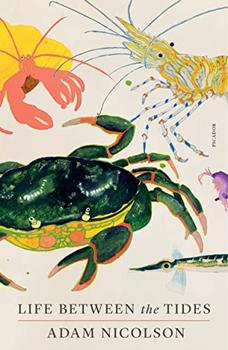Summary | Excerpt | Reviews | Beyond the Book | Readalikes | Genres & Themes | Author Bio

Next morning up early through the Atlantic oakwoods radiating their springtime green. Late May is the moment of perfection when the West Highlands start to acquire that burnish and glow which coats them for a few weeks at the beginning of summer. Cuckoos in the alders. Blackcaps in every other tree. Pied wagtails down on the wet rocks. The hollow notes of other, more distant cuckoos sounding as if they were calling through cupped hands. Everywhere the shadowed hyacinth blue of the bluebells and their scent.
Up out of the woods and on to the top of the hills. The whole riven province of Morvern, a mountainous fin of Scotland 80,000 acres wide and almost entirely surrounded by sea lochs, was laid out below us. We skirted the shoulders of the mountains and dropped to the pastures of a salmon river, past the freshwater loch at its head where the water slid out over the sandy beach, braided like silk, looking like whisky, and then along a heronhaunted shore to the sea.
Three miles to go. At last, we rounded a corner, past an eighteenth-century steading now used to shear and dag the sheep, and as the track turned, the bay appeared below, wide and tall, a world in itself, a half-circle of dark cliffs and wood-thickened slopes, the rim of those cliffs about 700 feet above the sea, waterfalls dropping over them at intervals and through the woods to the rocky shore. A track hairpinned steeply down under the old lime trees.
It felt, as all good places feel, hidden from the world, enormous and strangely private. The bay looked out to the south, to the hills in Mull. To the south-east, seven miles away, the single white finger of the lighthouse on Lismore. Behind it, the hills above Oban.
This was the geometry: away from the wind, a cliff-backed semicircle of a bay, about a mile across and reaching half a mile in from the waters of the Sound, with strongly marked headlands at each side, the one to the west made of basalt, that to the east of limestone.
The head of the bay is lined with a dark beach, black basalt sand, the ground-down lavas from a volcano in Mull, lightened only with a scatter of broken cockles, an occasional bit of seaglass, the bottom of a bottle, some old limpets and mussels. Across it a small burn emerges from the flag irises of a bog and makes its way in zigzags that change with every tide and storm.
Even now, on each arrival, I go down to the beach. On the ebb, mounds of seaweed, most of it serrated wrack, lie about on the muddy-sandy surface. They look like piles of day-old salad. The sea extends away down the Sound in a perfect mirror. The abandoned shells lie on the drying sand. One half of a razor clam is out in the air, its gloss gone. There are some worm casts and a barnacle-encrusted rock, a bruised and battered lump of the ancient rocks brought here by the glaciers from further east.
I wade out into the shallows where, a foot deep and an hour before low water, the last of the tide is running between my calves. Little counter-whorls of current flicker in the surface just downstream of me. This is the world of flux and if I stand still in those shallows for a minute I am surrounded by the flitter and skitter of life. All kinds of resilient and defended creatures appear. Hermit crabs are suddenly busy on the sea floor in their winkles and whelks like porters with trolleys at a station. Everywhere I look, they are about their business. Some of those shells are encrusted with patches of the limy, self-hardening seaweed, the pink coralline. One has a sprig of wrack growing from its shell, an eighth of an inch tall. They scurry across the seabed, hurrying between the crumble-crusty, frilly-topped tubes of the sand-masons. There is a small greenish fish tooling around my feet, a common goby, less than half an inch long, its boxy body sprinkled with red spots, but with a bright green nose. I bring my hand down into the water beside and underneath it, a Gulliver presence in its Lilliputian world, and unlike any other fish I have ever known, it does not react but continues poking and looking, dark- and bubble-eyed, investigative at this intrusion, but not alarmed at the idea of an intrusion itself.
Excerpted from Life Between the Tides by Adam Nicolson. Published by Farrar, Straus and Giroux. Copyright © 2021 by Adam Nicolson. All rights reserved.
Flaming enthusiasm, backed up by horse sense and persistence, is the quality that most frequently makes for ...
Click Here to find out who said this, as well as discovering other famous literary quotes!
Your guide toexceptional books
BookBrowse seeks out and recommends the best in contemporary fiction and nonfiction—books that not only engage and entertain but also deepen our understanding of ourselves and the world around us.